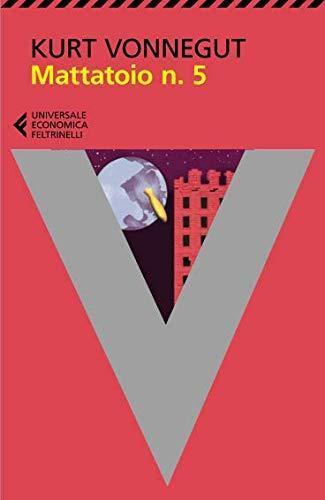Visionario
4 stars
Da avvicinare alla Trilogia della Città di K. Incomprensibile per gli umani.

Paperback, 208 pages
Italian language
Published Feb. 28, 2014 by Feltrinelli.
Mattatoio n. 5 è la storia semiseria di Billy Pilgrim, un americano medio, un uomo qualunque con però l'eccezionale capacità di passare da una dimensione spaziale all'altra. Senza essere in grado di impedire la cosa, può trovarsi ora a Dresda durante la Seconda guerra mondiale, ora nello zoo fantascientifico di Tralfamadore dove è esposto come esemplare della razza umana. Ma Mattatoio n. 5 è anche uno dei più importanti libri contro la guerra che siano mai stati scritti, autentica pietra miliare della letteratura antimilitarista. Kurt Vonnegut trae ispirazione dalla sua personale esperienza bellica quando, fatto prigioniero dai nazisti, ebbe la ventura di assistere alla distruzione di Dresda, la Firenze del Nord, da parte degli Alleati. Fu testimone di uno dei più terribili bombardamenti della storia, sopravvivendo grazie al suo osservatorio molto particolare: una grotta scavata nella roccia sotto un mattatoio, adibita a deposito di carni, nelle viscere della città. Quando …
Mattatoio n. 5 è la storia semiseria di Billy Pilgrim, un americano medio, un uomo qualunque con però l'eccezionale capacità di passare da una dimensione spaziale all'altra. Senza essere in grado di impedire la cosa, può trovarsi ora a Dresda durante la Seconda guerra mondiale, ora nello zoo fantascientifico di Tralfamadore dove è esposto come esemplare della razza umana. Ma Mattatoio n. 5 è anche uno dei più importanti libri contro la guerra che siano mai stati scritti, autentica pietra miliare della letteratura antimilitarista. Kurt Vonnegut trae ispirazione dalla sua personale esperienza bellica quando, fatto prigioniero dai nazisti, ebbe la ventura di assistere alla distruzione di Dresda, la Firenze del Nord, da parte degli Alleati. Fu testimone di uno dei più terribili bombardamenti della storia, sopravvivendo grazie al suo osservatorio molto particolare: una grotta scavata nella roccia sotto un mattatoio, adibita a deposito di carni, nelle viscere della città. Quando alla fine uscì allo scoperto, al posto di una delle più belle città del mondo c'era un'ondulata distesa di macerie sopra un numero incalcolabile di morti. L'unico modo per narrare questa terribile esperienza, di per sé assolutamente indicibile, pare allora per Vonnegut quello visionario e di una comicità paradossale, che sa affiancare con maestria sorriso e dolore, grottesco e leggerezza della fantasia.
Da avvicinare alla Trilogia della Città di K. Incomprensibile per gli umani.
I liked how Vonnegut manages to tell a poignant war story in a gentle way, without any attempt to glorify anything or anyone. I guess this became a classic because it makes people reflect on their values and their approach to life. And maybe even prompt them to question their own views. To do the above through a novel in a gentle way is the accomplishment of this book.
This is my first Vonnegut novel. When I was reading it, I was surprised how much Douglas Adams' (Hitchhiker's Guide to the Galaxy) style was influenced by Vonnegut.
I don't think that Vonnegut writes poorly, nor do I think this work lacks inherent interest. It's more-so that this, alongside Catch-22 and the like, is a genre I just can't get behind. I understand the need for anti-war fiction, indeed even fiction mostly accounted from real life witness. With that being said, it seems that once you've read one 'war is futile and nothing makes sense, but that's what war is all about' book, you've read them all.
Am I so far out of touch with those in the story that I just don't get it? Well, actually no, and I don't think that this would be Vonnegut's aim either. I hope that war has been made so redundant to me that the thought of going through something like this in life continues to be a totally alien concept to me and everyone else. But I'd also hope that …
I don't think that Vonnegut writes poorly, nor do I think this work lacks inherent interest. It's more-so that this, alongside Catch-22 and the like, is a genre I just can't get behind. I understand the need for anti-war fiction, indeed even fiction mostly accounted from real life witness. With that being said, it seems that once you've read one 'war is futile and nothing makes sense, but that's what war is all about' book, you've read them all.
Am I so far out of touch with those in the story that I just don't get it? Well, actually no, and I don't think that this would be Vonnegut's aim either. I hope that war has been made so redundant to me that the thought of going through something like this in life continues to be a totally alien concept to me and everyone else. But I'd also hope that books of this manner would still resonate and serve as a reminder of those that did go through such events and a warning for the rest of us not to repeat such dark times. This didn't happen here with me, nor have any other stories I've read in this genre. Works like The Gulag Archipelago on the other hand - that's a tour de force to contend with.
There were some phrases in the book, some descriptions that I really did like. An overweight man sits down on a bed. Rather than stating that the springs creaked or some-such, Vonnegut writes 'the mattress springs had a lot to say about that'. Great! Witty! Funny! But overall I cannot recommend it.